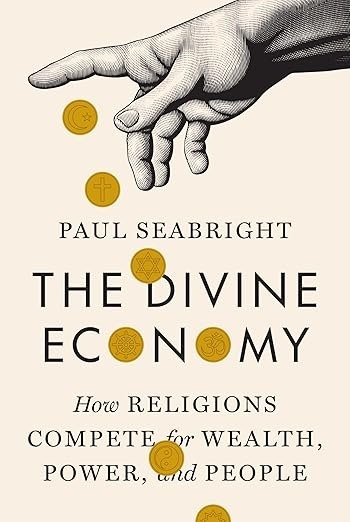Paul Seabright's new book describes how religions operate like businesses, competing for wealth and influence

The Divine Economy: How Religions Compete for Wealth, Power and People (Princeton University Press) by Paul Seabright
Not long ago, religion seemed to be in terminal decline. But, as Paul Seabright points out in his impressive new book, it is now going from strength to strength. Local cults or “ethno-religions” may have dwindled, but the big brands are doing well: Christianity still commands the loyalty of about a third of the world’s population, while Islam has climbed to a quarter, and the proportion identifying as atheists and agnostics has dropped slightly in recent years.
What can explain the persistence of religion? Seabright’s starting point is simple but smart: that religion is not really a matter of belief. Religious creeds are, he argues, “the result of belonging to a religion, and not the reason why people belong to a religion in the first place”; on top of that, they tend to be vague, ambiguous and “incompletely worked out”. For most religionists, in short, “believing is optional”.
Much of The Divine Economy is devoted to exploring the part played by religion in half a million years of human evolution. Religions confer benefits on communities, Seabright claims, by promoting “grand and ambitious stories” which offer dignity and hope, making their adherents bolder than they would otherwise be and thus promoting material prosperity. Religions also give stability to social structures, generating discipline not from some centralised authority but – at minimal political cost – from “the vigilance of their members”. Without religions, he concludes, we would never have become the “cooperative, talkative, narratively minded, entrepreneurial animals that we are”.
Seabright is an economist by profession, and the most original passages in The Divine Economy are those in which he argues that religions are essentially “businesses”, competing with one another for “wealth, power and people”. But religions are businesses of a special kind: they are “platforms”, according to Seabright, which means that they function like enormous clubs. Instead of supplying their clients with discrete products such as tomatoes, bicycles, or haircuts, they put them in touch with each other and facilitate their interactions, so that, as the saying goes, “their customers are their product”.
Most of us are familiar with platforms in digital incarnations such as social media, online marketplaces and crowdfunding sites; but they existed long before the internet, and the old-time religions are, according to Seabright, a prime example. He begins his book with a straightforward question: why do desperately poor people give away their money to very rich churches? The easy answer would be that they have been gulled into paying for goods that will never be delivered, but Seabright maintains that they are making a sensible bargain: buying access to a boundless community which will supply them with fellowship and security, along with connections to potential friends – including people of wealth, influence and privilege, and eligible marriage partners. That is why religions have weathered the storms of modernity – repeated confrontations with scientific rationality together with inter-religious rivalries – without shedding popular support.
Seabright has done something very unusual in The Divine Economy: he has found something new to say about religion. We owe him thanks, but we may also wish he had gone a bit further. He says very little about the personal significance of religious experiences, which makes his book rather like an account of the movie business that fails to mention any films. But in a way that is exactly his point: religions, like other businesses, are woven out of many strands, every one of which – from artistic exhilaration to platitudinous tedium, from serious inquiries to silly rituals, from loving kindness to cruelty, exploitation and sexual abuse – can also be found in non-religious institutions. There is, it would seem, nothing special about religion.
Religion still enjoys distinctive prestige, however, and Seabright notes that political operators like Erdoğan, Trump, Putin, Modi, Xi and Netanyahu have bolstered their popularity by wrapping themselves in cloaks of piety. But he also points out that religions which align themselves with politicians may put off potential followers. That is, however, a rather narrow way of viewing the links between religions and politics.
When mass progressive parties came into being in the 19th century, they had a lot in common with religions, often consciously so (think of “the religion of socialism” and “the religion of humanity”). Like religions, they functioned as platforms, offering their members infinite comradeship based on strong narratives of collective hope, but without requiring much in the way of detailed beliefs. (The same applies to their wicked young siblings: mass parties of the right.)
Those of us who look forward to a future without religion are left with a tricky question: when is a religion not a religion? If the world ever falls into line with our wishes, and everyone comes together to support humanism, socialism, science, peace and environmental salvation, will that mean the world-historical defeat of religion, or its ultimate triumph?
This article is from New Humanist’s winter 2024 issue. Subscribe now.
